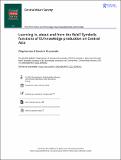Files in this item
Learning in, about and from the field? : Symbolic functions of EU knowledge production on Central Asia
Item metadata
| dc.contributor.author | Kluczewska, Karolina | |
| dc.contributor.author | Korneev, Oleg | |
| dc.date.accessioned | 2022-09-05T16:30:14Z | |
| dc.date.available | 2022-09-05T16:30:14Z | |
| dc.date.issued | 2022-09-05 | |
| dc.identifier | 280285480 | |
| dc.identifier | aaabab46-101f-42b0-8c34-ce8357bbe892 | |
| dc.identifier | 000850163600001 | |
| dc.identifier | 85137774743 | |
| dc.identifier.citation | Kluczewska , K & Korneev , O 2022 , ' Learning in, about and from the field? Symbolic functions of EU knowledge production on Central Asia ' , Central Asian Survey , vol. Latest Articles . https://doi.org/10.1080/02634937.2022.2095352 | en |
| dc.identifier.issn | 0263-4937 | |
| dc.identifier.uri | https://hdl.handle.net/10023/25949 | |
| dc.description | This work was supported by the project ‘Contested Global Governance, Transformed Global Governors? International Organisations and “Weak” States’ of the French National Research Agency [grant number ANR-16-ACHN-0034] and Research Foundation Flanders (FWO) [grant number 12B9422N]. | en |
| dc.description.abstract | Examining the European Union’s (EU) engagement with Central Asia since the early 1990s, we see an increased commitment to context sensitivity. Arguably, in order to design ‘better’ interventions, the EU needs to know more about this region. This article explores three means of EU learning: in the field – through EU officials’ first-hand experience of working at EU Delegations in Central Asia; about the field – through programmed channels of external expert knowledge, and in particular think tanks; and from the field – during institutionalized consultations with multiple local actors, such as academics, journalists and non-governmental organizations. It is argued that despite this complex learning infrastructure, EU knowledge production on Central Asia has a predominantly performative character. Rather than leading to changes in its relations with Central Asia, new knowledge produced by the EU aims at legitimizing this organization’s pre-existing frameworks of engagement and practices of interactions with the region, and substantiating existing policy priorities. | |
| dc.format.extent | 21 | |
| dc.format.extent | 2019580 | |
| dc.language.iso | eng | |
| dc.relation.ispartof | Central Asian Survey | en |
| dc.subject | European Union | en |
| dc.subject | Knowledge production | en |
| dc.subject | Learning | en |
| dc.subject | Legitimation | en |
| dc.subject | Local turn | en |
| dc.subject | Practice turn | en |
| dc.subject | JZ International relations | en |
| dc.subject | T-NDAS | en |
| dc.subject.lcc | JZ | en |
| dc.title | Learning in, about and from the field? : Symbolic functions of EU knowledge production on Central Asia | en |
| dc.type | Journal article | en |
| dc.contributor.institution | University of St Andrews. School of International Relations | en |
| dc.identifier.doi | 10.1080/02634937.2022.2095352 | |
| dc.description.status | Peer reviewed | en |
This item appears in the following Collection(s)
Items in the St Andrews Research Repository are protected by copyright, with all rights reserved, unless otherwise indicated.

